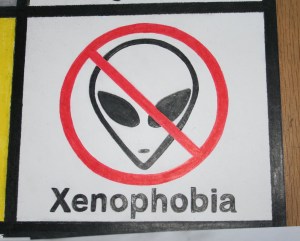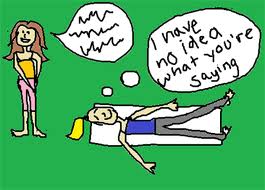Misuse or evolution?
Who are the ‘hoi polloi’? This Greek expression, meaning ‘the many,’ has traditionally
referred to the common people or the masses. But it is being used increasingly as a synonym for high society. Why? Is this some misapprehension based on a fallacious belief in a connection with ‘hoity-toity’? I could rail against such a misuse but if people continue to use it this way, it will probably become another of those curious expressions in English with contradictory meanings.
We have quite a few of them, known as auto-antonyms. They include the verb ‘bolt,’ which can either mean tosecure in place or to dash away suddenly. To ‘buckle’ can either fasten or collapse. To ‘cleave’ can adhere or divide. ‘Custom’ can be normal or specially made. ‘Fast’ can be firmly fixed or moving away quickly. ‘Give out’ can mean to distribute or cease to function. ‘Hold up’ can support or hinder. ‘Left’ can mean departed or remaining. A ‘peer’ can be an equal or a nobleman. A ‘sanction’ can be an endorsement or a punitive action. ‘A scan’ can mean a brief glance or a detailed examination. A ‘screen’ can provide either a view or shield. And to ‘table’ can be to propose or to postpone.
Then there are expressions like ‘fulsome praise’. Traditionally this has been something to be wary of: excessive and insincere compliments that suggest you should watch your back. But lately it’s being used as a synonym for ‘high’ praise. Can we do anything about this? Should we? After all, ‘take care’ used to mean ‘watch it, mister’. Now it’s a term of genuine concern.
Another word under threat of changed meaning is ‘decimate’. This was a method of harsh discipline dealt out in Roman Armies to punish cowards or mutineers. A unit designated for ‘decimation’ was divided into ten. Soldiers drew lots. The one who drew the unlucky number, regardless of blame, was executed by his nine fellow soldiers. But lately this word’s specific historical meaning has been forgotten as ‘decimated’ is used as a near synonym for ‘annihilated’. There’s even an interpretation of the word to mean ‘so devastated by defeat that there is barely ten percent of the original number left’.
And there are others under threat of change.
‘Penultimate’ has always meant second-last. Lately it’s being used as a way of saying ‘beyond ultimate,’ which makes it a comparative absolute like ‘more perfect’— in other words, completely illogical.
‘Enervated’ has always meant ‘exhausted’. But from sports commentators (ever on the lookout for new jargon) I’ve heard the word used as a fancy way of saying ‘energised’.
What would Mrs Malaprop say? It’s a beggar’s belief, my Lord.
Sometimes these can be misnomers, like ‘American football’ (just how often do those padded steamrollers use their feet to propel the ball?), ‘tin cans’ and ‘tin foil’ (made from aluminium, not tin), ‘dry-cleaning’ (which uses a fluid) and ‘piano quintet’ (which does not involve five pianos).
And sometimes the word has simply shifted in meaning: like ‘awful’ (no longer full of awe), ‘terrific’ (no longer terror inducing) and ‘fantastic’ (seldom used with regard to fantasy). ‘Dreadful’ is no longer used to mean filled with dread. ‘Awesome’ is no longer frightening,
just a synonym for ‘awe-inspiring’. ‘Terrible’ and ‘horrible’ were once adjectives for ‘terror’ and ‘horror,’ before being downgraded. And even the non-word ‘um’ is regularly replaced by ‘like’ (if you’re under thirty) or ‘Mr Speaker’ (if you’re a politician).
Then there’s ‘literally,’ a word that lingers on the border of misuse and acceptance. This one used to mean ‘actually’ but these days it’s often used for emphasis, replacing ‘figuratively’. I think it’s wrong. I think they’re all wrong. But as King Canute demonstrated, there are limits to individual resistance in the face of a strong tide. And preventing language change by legislation and the establishment of rule-making bodies has never worked. Complaining won’t work either but it’s a form of therapy. And surely that’s better than tears of frustration.
Ces’t la guerre. C’est la langue.
Like, you know what I mean?
There’s an Australian stand-up comic who performs an entire skit using only the word ‘mate’. He manages to convey a huge range of nuance and humour through intonation, facial expression and inflection. Using just the one word this guy can express emotional states of alarm, amusement, authority, camaraderie, cynicism, despair, fraternity, horror, incredulity, inebriation, lasciviousness, resignation and torpor. It takes a real actor as well as comedic talent to do this successfully. I’ve seen an American comic attempt the same thing with ‘Dude:’ amusing, for sure, but in my opinion this word lacks the same emotional range. Perhaps it’s something to do with the longevity of ‘mate,’ which was in common use when Terra Australis was settled by the British empire in the late 1700s, and the universality of the word, crossing divides of class, region, gender and age.
Alas, the same cannot be said for ‘like’.
Today we speak the world’s largest language. English-speakers have synonyms and choices of expression for the most subtle shades of meaning. We can draw on derivations from our tripartite sources of Anglo-Saxon, French and Latin, as well as thousands of borrowed (okay, stolen) words and phrases from the world’s other tongues. There has never been a language so large, so widely spoken or so adaptable to innovation and adaptation. Then how did we arrive at the twenty-first century with a significant portion of our younger population spouting seemingly incoherent babble?
‘I’m, like, you know, and he’s like, you know, and I’m, like, WHOA, and he’s like WHO-HOA, and, like, yeah.’
Am I being unfair? Of course both speaker and listener understand one another. It’s code, it’s sub-culture, it’s the language of youth (or should that be ‘youf’?) and they don’t want adults to understand what’s being said. In this country we’ve been up to such tricks since our early convict days, when the so-called ‘flash language’ was a thieves’ argot for chat and message-passing that troopers in that early police state couldn’t follow. Cockney rhyming slang had much the same origin, a way to include and exclude certain speakers.
My problem isn’t with the language of youf. My problem is the deracinated and mindless aping of someone else’s fashion: specifically the derivative slang of Valley-girl speak from 1980s California. I’m not saying it’s all incomprehensible, even if the habits do seem ubiquitous. ‘Awesome’ has replaced ‘awful’ to mean inspiring. I accept that change as language evolution. ‘Totally’ is the new ‘yes,’ while ‘as if’ counts for a cynical version of ‘not bloody likely’. Most speakers of English can follow what’s being said with those. But what happens when we’re presented with the following offering as conversation?
‘Dude, it’s like, sort of, you know, it’s kind of, like, well, you know what I mean, it’s like,
yeah. You know?’
Do I? No, I don’t. But I’ll nod in the hope that a meaning will become apparent. It’s like, it’s like… it isn’t like. If this phenomenon is truly ‘like’ anything, perhaps it’s those action movies or X-Box games where the special effects make more sense than the dialogue. So are we looking at the chicken or the egg here? Do cultural products such as films or television affect the language or only reflect it? Are its actors offering a negative role model or merely the expression of an era, holding the mirror up to modern speech? Think of Ashton Kucher in most of his roles. Think of Keanu Reeves in, well, anything.
Maybe this is nothing new. Maybe this incomprehensible bilge is only the latest version of a normal (if unpalatable) aspect of language evolution. People–some people–are using fewer words. For example, there’s the expression ‘It’s as bad as.’ And? I’m waiting for the comparison that never comes. As bad as what? Yet I can see the logic to this type of expression, an attempt to describe something so bad that the speaker lacks words for it. Sometimes less is more.
At the opposite end of the incomprehensibility spectrum there’s the phenomenon of too many words, used for bluff and bluster. Such educated-sounding nonsense is no more helpful than using ‘like’ or ‘as bad as’; worse, this surfeit of words becomes camouflage. And it’s been gushing from the mouths of bureaucrats and politicians for decades. We need look no further than the genius of Yes, Minister.
Sir Humphrey: The relationship which I might tentatively venture to aver has been not without some degree of reciprocal utility and perhaps even occasional gratification, is emerging a point of irreversible bifurcation and, to be brief, is in the propinquity of its
ultimate regrettable termination.
Yeah, what he said.
Like.
Foreigners are fiends
I wonder. Are the following actual examples of linguistic racism, or just expressions of English-speaking xenophobia that over the centuries have lost their bite? Most of them have a sense of play, though perhaps not fair play.
There’s no denying that certain nationalities have copped a disproportionate level of sneering from English speakers; notably the Welsh, the Dutch and the French.
‘Welsh rabbit’ isn’t rabbit but merely cheese (the variation ‘Welsh Rarebit’ came later, perhaps as a sop to claims of chauvinism). It originates from a time when anything Welsh was considered inferior by the English. ‘Welsh comb’ was using one’s fingers as a comb. ‘Welsh mortgage’ was a promise you couldn’t rely on. An insect known as a ‘Welsh cricket’ was in fact a louse. To ‘welsh/ welch’ on a bet meant that you couldn’t be trusted to pay up. And a ‘Welsh mile’ was any long and convoluted route.
The Netherlands were often at war with England. These two countries combined military forces with an uneasy grace when William of Orange ascended the English throne. Some of the better-known sneers may date from this time. ‘Dutch courage’ is false courage, usually brought on by an excess of alcohol and diminished judgement. ‘Dutch wife’ is another name for a prostitute or a sex doll. ‘Dutch cap’ is a nickname for a condom. ‘Dutch concert’ is a noisy uproar. ‘Double Dutch’ is gibberish. ‘Dutch uncle’ is someone giving unwelcome advice. And a ‘Dutch treat’ (sometimes known as ‘going Dutch’) is no treat at all, as you pay for your own.
As for France, when has there not been enmity between these two neighbours across the channel? ‘French letters’ are condoms. ‘French kisses’ are the licentious kind, presumably racier than chaste kisses of the English. ‘French leave’ means taking leave without permission. ‘French cricket’ is an inferior playground-only form of cricket. ‘French disease’ is a form of syphilis. And ‘Pardon my French’ refers to the utterance of inadvertent obscenity.
‘The English, the English, the English are best. I wouldn’t give tuppence for all of the rest.’
Yes, indeed. Flanders and Swann summed up this sneering tendency, with heavily laced irony, in their immortal lyric, ‘A Song of Patriotic Prejudice’ (1963): ‘It’s not that they’re wicked or naturally bad… it’s knowing they’re FOREIGN that makes them so mad!’
Those were the days, chaps.
Accentuate the positive
When I suffered for a managerial salary in the Australian employment industry during the 1990s, companies seeking staff for call centres and other customer service positions often asked for prospective employees who didn’t have an accent.
Impossible: everyone has an accent. But the unspoken code meant that some employers wanted to screen out voices that could—in their opinion—jeopardise a sale; such as (we supposed) Asian, sub-continental or European voices. The exact criteria were never specified, of course; nor were the exact target markets specified. I think the appropriate cliché would be ‘I’m not a racist but…’
Setting aside the flawed logic, I assumed this was all about perceptions of a supposed ‘mainstream’ market. Elsewhere in the English-speaking world, say the USA (depending on regional prejudices), this type of screening out might have included Hispanic, African or Southern accents. In England the practice could have filtered out South-African, New Zealand or Irish voices. It was all about potential risk for a sale to this or that demographic. Ridiculous and nasty: it could never happen now. Hmm. I’m not a cynic but…
To find speakers without accents would be quite an achievement of linguistic ingenuity. Yes, I know that’s a factoid from the Department of the Bleeding Obvious. I did suggest to staff they could ask the more open-minded recruiters to pronounce ‘slow’ or ‘path’ or ‘shibboleth’ and try to prove they didn’t have an accent. Waste of effort. They knew that we knew, so we quietly blacklisted the bastards and they quietly went elsewhere for business.
No doubt they found some far more underhand ways of hiring.
You say ‘tomato’ and I say ‘tomato’. In written form these look identical, but spoken they help to define us, even locate us. Do we dream with an accent? Probably. Certainly when reading we have an accent: the little voice inside that nobody else hears. Canadians read Alice Munro or Margaret Attwood with a different tonality to Scots reading Iain Banks or Irvine Welsh. And there’s more happening than mere accent; including rhythm, cadence and pitch.
Our accents may be attractive, even adorable, to some; but not to everybody. They can limit our opportunities and set up barriers. What a pity that something so unifying can also set us apart. Distinctions of class, socio-economic status, education, and of course ethnic heritage come into play, even in seemingly innocuous ways. Whether I pronounce
‘h’ as ‘aitch’ or ‘haitch’ defines me more than dance or ‘dahnce’ and branch or ‘brahnch’. How I say ‘school’ or ‘car park’ or ‘vitamin’ helps to locate me and to pigeon-hole me. ‘enry ‘iggins hain’t hextinct.
Unlike Shaw’s curmudgeonly philologist, I’ve decided to adopt a Pollyanna attitude when I hear criticism of anyone’s accent. Lennon and McCartney both had accents when they wrote ‘Love is All You Need’ and meant it. Good advice for a band of English-speakers, in fact an entire language orchestra for which the only audition piece is learning to play your particular instrument. Some of us belong in the string section and some in the woodwind. Now I’m no Biblical scholar but didn’t St Paul write something to the Corinthians about people without love being a loud gong or a clashing cymbal?
Orchestras need percussion. I can think of a few hard-to-love gongs and clashing cymbals I’d be happy to place just behind the French horns: an ideal spot for anyone who doesn’t think they have an accent.



